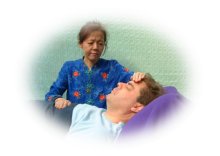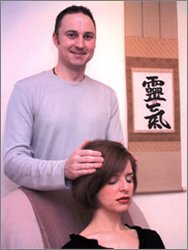 During a Reiki session the practitioner places his or her hands on or over the client's body, delivering healing energy that breaks up negative blockages and restores positive energy flow. |
This ancient form of energy healing is based on the idea that we all have an invisible "life force energy" (or Ki) that flows through our bodies and causes us to be alive. This energy, however, is often disrupted by our own negative thoughts and feelings (both conscious and unconscious ones). If your Ki becomes too low, you are at an increased risk of becoming stressed out, sick, tired and unhappy.
"Ki is flowing in everything that is alive including plants, animals and humans. When a person's Ki is high, they will feel strong, confident, and ready to enjoy life and take on its challenges. When it is low, they will feel weak and are more likely to get sick," says William Lee Rand, founder and president of The International Center for Reiki Training.
How Does Reiki Work?
Reiki (pronounced "ray-kee") is a gentle, hands-on technique in which a practitioner channels the healing energy through their hands and into the client.
The energy naturally flows where the negative thoughts and feelings are attached, thereby clearing any blockages and restoring a normal flow of energy. In other words, Reiki clears and heals the clouded energy pathways and allows the life force to flow through again.
"As Reiki flows through a sick or unhealthy area, it breaks up and washes away any negative thoughts or feelings lodged in the unconscious mind/body thus allowing a normal healthy flow of Ki to resume. As this happens, the unhealthy physical organs and tissues become properly nourished with Ki and begin functioning in a balanced healthy way thus replacing illness with health," Rand explains.
 It's said that anyone can perform Reiki, but you first must be attuned to the energy by training with a Reiki Master. |
While it is possible to be born with the ability to use Reiki, most people must first be attuned to it (by training with an experienced Reiki Master) before they can channel it to someone else.
Reiki Benefits to the Mind and Body
Reiki is most commonly used as a tool for stress reduction and relaxation, but its benefits seem to extend much further. Scientific studies regarding Reiki are still few and far between, but those that have been done, along with a host of client testimonials, have found that Reiki:
- Helps relieve pain
- Eases the symptoms of depression and anxiety
- Alleviates the symptoms associated with multiple sclerosis, lupus, fibromyalgia and thyroid goiter
- Promotes better sleep
- Reduces blood pressure
- Instills peace in terminally ill cancer patients
- Creates deep relaxation in the body and helps relieve stress
- Supports the immune system
- Helps the body to rid itself of toxins
- Helps the body to recover after surgery and chemotherapy, and reduces some drug side effects
"A treatment feels like a wonderful glowing radiance that flows through and around you. Reiki treats the whole person including body, emotions, mind and spirit creating many beneficial effects that include relaxation and feelings of peace, security and well-being. Many have reported miraculous results," according to the International Center for Reiki Training.
Meanwhile, the National Center for Complementary and Alternative Medicine (NCCAM) is sponsoring scientific studies to find out more about how Reiki works and how it may help with various diseases.
Where Can You Find a Reiki Practitioner?
Reiki is offered at many locations across the country, including hospitals for cancer patients, emergency rooms, nursing homes, hospices, OB/GYN units and health spas, but you can also find individual Reiki practitioners.
No comments:
Post a Comment